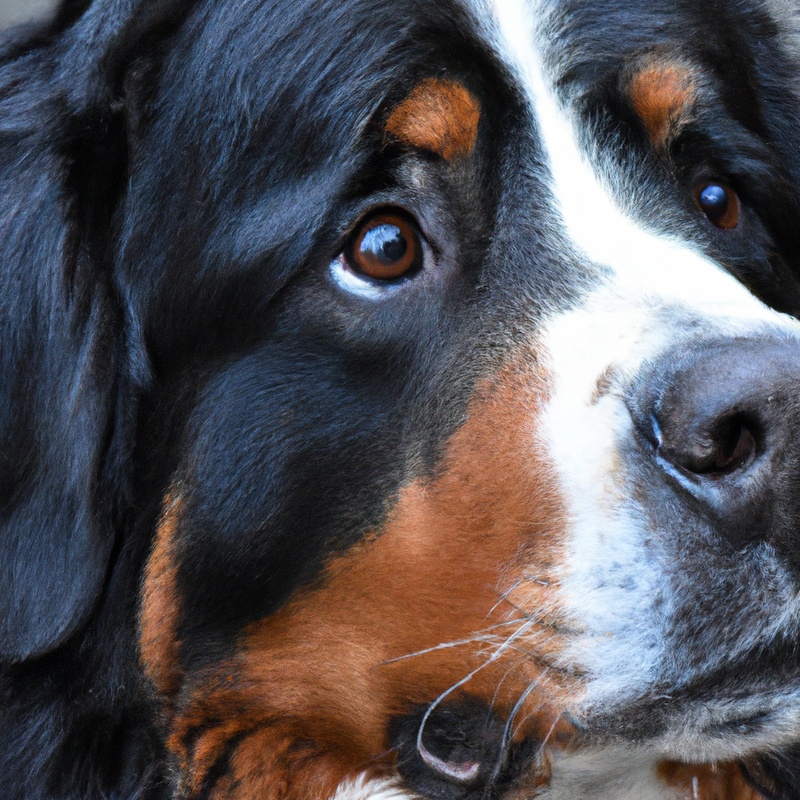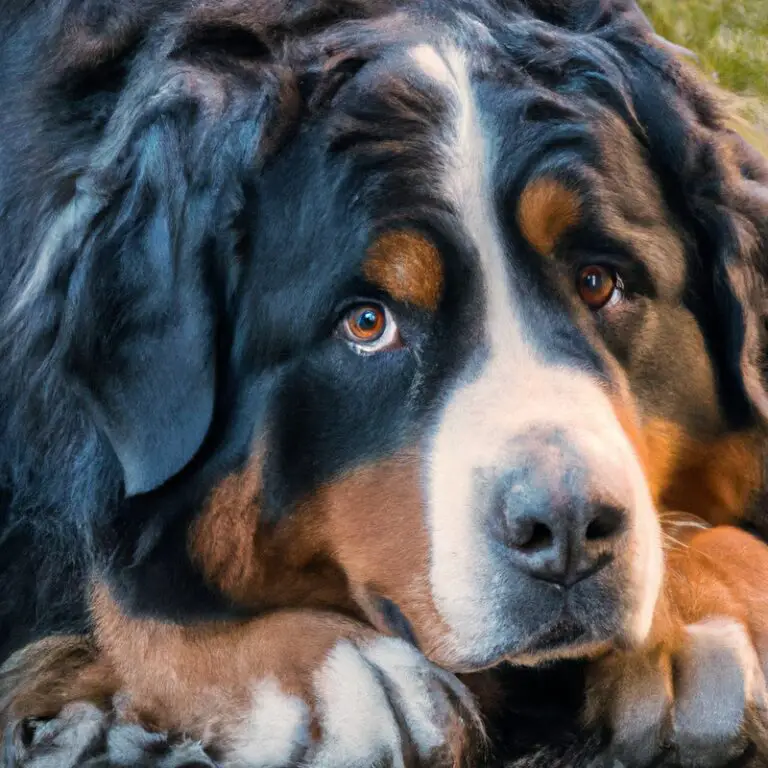What Are The Typical Sleeping Habits Of Bernese Mountain Dogs?
Key Takeaways:
- Bernese Mountain Dogs tend to sleep for long periods of time, averaging about 14-16 hours per day.
- They are known to have a preference for sleeping in cooler areas or on hard surfaces.
- Bernese Mountain Dogs may exhibit more frequent napping during the day, especially after physical activity.
- The sleeping habits of Bernese Mountain Dogs can vary depending on age, health, and individual preferences.
Hey there, dog lovers! Have you ever wondered why your furry friend can snooze for hours on end? Well, today we’re diving into the fascinating world of Bernese Mountain Dogs and their typical sleeping habits.
As a self-proclaimed dog aficionado, I’ve witnessed firsthand just how important sleep is for our canine companions.
From understanding the ideal sleep duration to creating a cozy sleeping environment, we’ll explore it all. Plus, we’ll unravel the mysteries behind common sleeping positions and how to address any pesky sleep disturbances.
So, grab a cup of tea and join me as we uncover the secrets of a good night’s sleep for Bernese Mountain Dogs!
| Sleeping Habits | Description |
|---|---|
| Hours of Sleep | Bernese Mountain Dogs typically sleep for about 12-14 hours per day. |
| Napping | They may take short naps throughout the day to rest and rejuvenate. |
| Sleep Areas | They prefer to sleep in comfortable spots, such as beds, couches, or soft surfaces. |
| Sleeping Positions | They may sleep in different positions, including curled up, stretched out, or leaning against something. |
| Sleeping Patterns | They often adjust their sleeping patterns according to their daily activities and the surrounding environment. |
The Importance of Sleep for Dogs
Why sleep is crucial for dogs’ health and well-being
Sleep is essential for dogs’ health and well-being. It allows their bodies to rest, recover, and recharge.
During sleep, dogs repair their muscles, strengthen their immune system, and process information from the day.
Lack of sleep can lead to increased stress, irritability, and a weakened immune system. It’s important to provide dogs with a comfortable and quiet sleeping environment and ensure they have enough time to rest.
A consistent sleep routine can help promote a healthy lifestyle for your furry friend.
Average Sleeping Hours for Bernese Mountain Dogs
Factors affecting the sleeping habits of Bernese Mountain Dogs
There are several factors that can affect the sleeping habits of Bernese Mountain Dogs:
- Age: Like humans, puppies need more sleep compared to adult dogs. As they grow older, their sleep patterns may change.
- Activity level: Dogs that are more active during the day tend to sleep more at night. Regular exercise can help promote better sleep.
- Health: Certain health conditions, such as pain or discomfort, can disrupt a dog’s sleep. It’s important to address any health issues that may be affecting your Bernese Mountain Dog’s sleep.
- Environment: A comfortable and quiet sleeping environment is important for dogs to get the rest they need. Make sure your dog has a cozy bed and a quiet space to sleep.
- Routine: Establishing a consistent bedtime routine can help signal to your Bernese Mountain Dog that it’s time to sleep. This can include activities like a bedtime walk or some quiet playtime.
By considering these factors and making adjustments if necessary, you can help ensure that your Bernese Mountain Dog gets the quality sleep they need for optimal health and well-being.

Typical sleep patterns and durations for Bernese Mountain Dogs
Bernese Mountain Dogs typically have a sleep pattern of around 12 to 14 hours a day, which is quite similar to other large dog breeds.
These dogs enjoy taking naps throughout the day and tend to have longer periods of deep sleep during the night.
Some Bernese Mountain Dogs may have shorter or longer sleep durations depending on their individual needs and activity levels.
Providing a comfortable and quiet sleeping area for your Bernese Mountain Dog will help them get the rest they need to stay healthy and happy.

Sleeping habits during different life stages (puppy, adult, senior)
Puppies have a lot of energy and tend to sleep a lot, typically around 18-20 hours a day.
As they grow into adults, they still require a good amount of sleep, but it decreases to about 12-14 hours.
Finally, as Bernese Mountain Dogs enter their senior years, their sleeping habits may change again.
They may sleep more, up to 16-18 hours a day, and may also experience more difficulty getting comfortable due to joint issues.
It’s important to provide them with a comfortable bed and regular exercise to support their sleep needs at every life stage.

Creating a Comfortable Sleeping Environment
Selecting an appropriate bed for Bernese Mountain Dogs
When selecting a bed for your Bernese Mountain Dog, consider their size and weight.
Opt for a bed that provides ample space for them to stretch out comfortably.
Look for a bed with thick and supportive padding to cushion their joints and provide them with good support.
Choose a material that is durable and easy to clean, as Bernese Mountain Dogs tend to shed a lot.
Lastly, consider their sleep style – if they like to nest or burrow, a bed with raised edges or a cozy cave-like design may be ideal.
Importance of providing a quiet and peaceful sleeping area for Bernese Mountain Dogs
Bernese Mountain Dogs, like any other dogs, need a quiet and peaceful sleeping area for a good night’s rest. It is important to provide them with a calm and comfortable space that is away from noise and distractions.
This will help them relax, recharge, and maintain their overall well-being.
To create an ideal sleeping environment, consider using a cozy dog bed or a designated sleeping area with soft bedding. Additionally, ensure that the space is free from excessive noise, bright lights, and other disturbances that might disrupt their sleep.
Maintaining optimal temperature for comfortable sleep
Maintaining the optimal temperature is important for ensuring a comfortable sleep for your Bernese Mountain Dog. Here are some tips to help you achieve this:
- Keep the sleeping area well-ventilated to allow for proper airflow, preventing overheating.
- Use a dog bed or mattress with breathable materials that promote air circulation and prevent trapping heat.
- Adjust the room temperature to a cool, but not cold, level. Around 65-70 degrees Fahrenheit is generally good.
- Avoid placing the dog’s bed near drafts or direct sunlight, as these can cause discomfort.
- Consider using a cooling pad or blanket during warmer months to help regulate body temperature.
Remember, every dog is different, so it’s essential to observe your Bernese Mountain Dog’s behavior and adjust accordingly to ensure their comfort during sleep.
Common Sleeping Positions of Bernese Mountain Dogs
Different sleeping positions adopted by Bernese Mountain Dogs
Bernese Mountain Dogs may have various sleeping positions, depending on their comfort and mood.
Some of the common sleeping positions adopted by these dogs include:
- Curled up: Many Bernese Mountain Dogs enjoy curling up into a tight ball when they sleep. This position helps them conserve body heat and feel secure.
- On their backs: Some Bernese Mountain Dogs love to sleep on their backs with their paws in the air. It’s a vulnerable position, but it allows them to cool down and stretch their limbs.
- Sprawled out: You might also find your Bernese Mountain Dog sprawled out on their side, with their legs extended. This position helps them cool off and relax their muscles.
- Leaning against something: Bernese Mountain Dogs occasionally lean against objects like walls, couches, or even other pets while sleeping. This position offers them a sense of support and stability.
Every Bernese Mountain Dog has their preferences when it comes to sleeping positions.
It’s important to observe your dog and provide a comfortable sleeping area that suits their needs.
What sleeping positions indicate about dogs’ comfort and well-being
The sleeping positions of dogs can indicate their comfort level and overall well-being.
Here’s what you can learn from your dog’s sleeping position:
- Curled Up: If your dog curls up in a tight ball, it might indicate that they feel safe and secure. This position helps conserve body heat and protect vital organs.
- On Their Side: When a dog sleeps on their side with their legs stretched out, it suggests that they are feeling relaxed and comfortable.
- Stretched Out: Dogs that sleep on their stomachs with their legs outstretched might be trying to cool down as this position exposes the belly to air circulation.
- Back Snuggled: If your dog sleeps on their back with their belly exposed and legs in the air, they are likely feeling extremely relaxed and trusting of their environment.
Remember, every dog is unique, so their sleeping positions can vary.
It’s important to observe your dog’s overall behavior and body language to understand their comfort and well-being.
Sleep Disturbances in Bernese Mountain Dogs
Potential causes of sleep disturbances in Bernese Mountain Dogs
Bernese Mountain Dogs may experience sleep disturbances due to various factors.
These potential causes can include:
- Medical conditions: Health issues like pain, discomfort, arthritis, or gastrointestinal problems can disrupt a dog’s sleep.
- Anxiety and stress: Dogs, including Bernese Mountain Dogs, can experience anxiety or stress that may keep them awake at night.
- Environmental factors: Loud noises, extreme temperatures, or uncomfortable bedding can disturb a dog’s sleep.
- Lack of exercise: Insufficient physical activity during the day can lead to restlessness at night.
- Poor sleep routine: Inconsistent sleep patterns or disruptions to a dog’s regular routine can affect their sleep quality.
- Age-related changes: Older Bernese Mountain Dogs may experience sleep disturbances due to age-related conditions or changes in their sleep patterns.
If you notice sleep disturbances in your Bernese Mountain Dog, it’s important to consult with a veterinarian to identify and address any underlying issues.
Recognizing signs of sleep disturbances in Bernese Mountain Dogs
You may notice signs of sleep disturbances in your Bernese Mountain Dog if they have difficulty falling asleep, experience frequent awakenings during the night, or have restless sleep patterns. Other indicators may include excessive daytime sleepiness, irritability, and changes in behavior or mood.
If you observe any of these signs, it’s important to consult with your veterinarian to determine the underlying cause and develop a suitable treatment plan.
Tips for addressing and improving sleep disturbances in Bernese Mountain Dogs
If your Bernese Mountain Dog is experiencing sleep disturbances, here are some tips to help address and improve the situation:
- Create a comfortable sleeping environment: Provide a cozy bed and a quiet, dark space for your dog to sleep. Make sure the temperature is suitable for them.
- Establish a consistent routine: Dogs thrive on routine, so try to establish a regular sleep schedule. Stick to a set bedtime and wake-up time to help regulate their sleep patterns.
- Provide daily exercise: Ensuring your Bernese Mountain Dog gets enough physical activity during the day can help tire them out and promote better sleep at night.
- Minimize disruptions: Reduce noise, light, and distractions in the sleeping area. Consider using earplugs or a white noise machine to drown out any disturbances.
- Address underlying medical issues: Sleep disturbances can be a sign of underlying health problems. If your dog’s sleep issues persist, consult with a veterinarian to rule out any medical conditions.
Remember, every dog is unique, and it may take some trial and error to find the best solution for your Bernese Mountain Dog. Be patient and provide them with the support and care they need for sound sleep.
Frequently Asked Questions about Bernese Mountain Dogs’ Sleeping Habits
What should I do if my Bernese Mountain Dog is not getting enough sleep?
If your Bernese Mountain Dog is not getting enough sleep, there are a few things you can try. Firstly, make sure they have a comfortable and quiet sleeping area.
Provide them with a cozy bed and ensure the room is free from distractions.
Additionally, establish a consistent sleep routine, including regular bedtime and wake-up times. Finally, consider your dog’s activity level and exercise them appropriately during the day to promote good sleep.
If these measures don’t improve their sleep, consult with your veterinarian for further guidance and any underlying health issues.
Is it normal for Bernese Mountain Dogs to snore while sleeping?
Yes, it is normal for Bernese Mountain Dogs to snore while sleeping. Snoring can occur in dogs of any breed, including Bernese Mountain Dogs.
Often, snoring in dogs is caused by the way their airways are structured.
Just like humans, dogs can experience soft tissue obstruction or partial blockage in their airways, leading to snoring. While occasional snoring is usually nothing to worry about, if it becomes excessive or is accompanied by other breathing difficulties, it’s best to consult with a veterinarian to rule out any underlying health issues.
How can I establish a bedtime routine for my Bernese Mountain Dog?
Establishing a bedtime routine for your Bernese Mountain Dog can help promote a healthy and peaceful sleep.
Here are some tips:
- Set a consistent bedtime and wake-up time for your dog.
- Create a calm and comfortable sleep environment.
- Engage in a relaxing activity before bedtime, like a gentle walk or snuggle time.
- Avoid stimulating activities or feeding close to bedtime.
- Provide a comfortable bed for your dog to sleep in.
- Be patient and consistent in implementing the routine.
Remember, every dog is different, so it may take some time to find what works best for your Bernese Mountain Dog.
Final Verdict
Understanding the typical sleeping habits of Bernese Mountain Dogs is crucial for their health and well-being. These dogs require a significant amount of sleep each day, especially during their puppy and senior stages.
Factors such as age, activity level, and environmental conditions can affect their sleep patterns.
Providing a comfortable sleeping environment, including a suitable bed and a quiet area, is essential. Additionally, recognizing signs of sleep disturbances and addressing them promptly is important for maintaining their overall health.
By ensuring that Bernese Mountain Dogs get enough quality sleep, we can contribute to their happiness and longevity.








